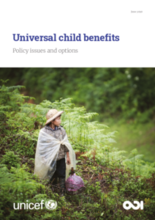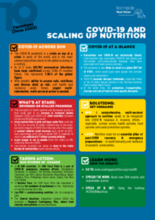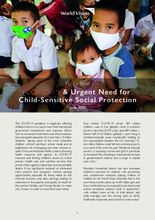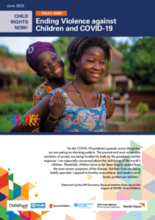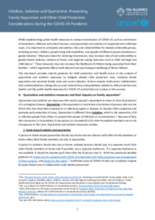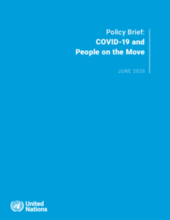Displaying 1381 - 1390 of 4424
This report from ODI and UNICEF critically reviews the case for universal child benefits (UCBs). It seeks to contribute to a burgeoning and lively debate on the (potential) role of UCBs as a policy instrument in the pursuit of child poverty reduction and universal social protection.
This editorial from The Lancet Global Health discusses the effect of COVID-19 on food insecurity, particularly for women and children.
This one-page factsheet from Scaling Up Nutrition (SUN) provides facts and information about COVID-19 and malnutrition.
Based on World Vision's extensive experience working with children and families in crisis, this policy brief outlines recommendations to stakeholders, such governments, UN agencies, NGOs, and donors, and calls for the use of child-sensitive social protection in these stakeholder’s responses to the COVID-19 pandemic.
In this policy brief, Joining Forces, as a coalition of six child rights organisations, calls for child protection to be prioritised in the response to COVID-19.
This webpage from UNICEF links to the Policy Brief on the Impact of COVID-19 on children, the Dashboard on Data to inform the COVID-19 response, and other key data resources on COVID-19 and its impacts on children.
This document provides interim guidance for child protection and health actors in the context of quarantine and isolation measures to mitigate related child protection risks, minimize family separation,and promote family unity and social cohesion.
This Policy Brief offers four basic tenets to guide our collective response to human mobility and the COVID-19 crisis, including the response to children on the move and children who are separated or unaccompanied in particular.
This virtual side event will focus on good practices in the joint implementation of the Child Protection mandate by both UN civilian, military and police peacekeepers, in order to highlight the critical need for adequately resourced specialized Child Protection functions and political space for civilian Child Protection Advisers and uniformed Child Protection Focal Points within UN peacekeeping missions.
ECDAN is interested in collecting and curating examples from on the ground programs and initiatives implemented all over the world in response to COVID-19 with a focus on early childhood development (ECD).

